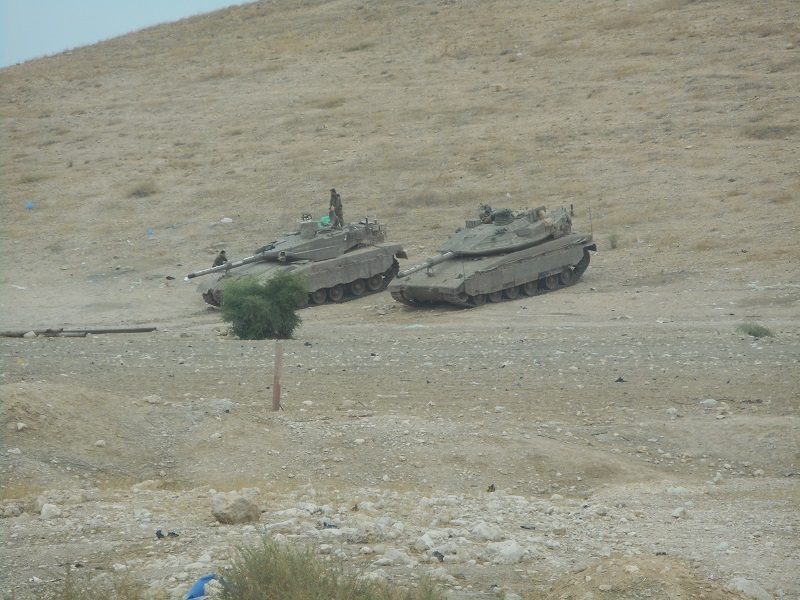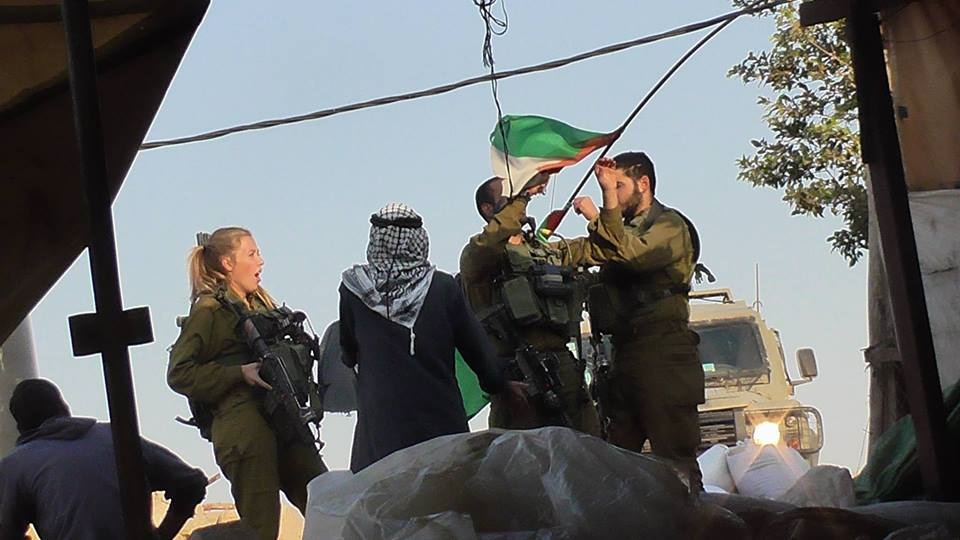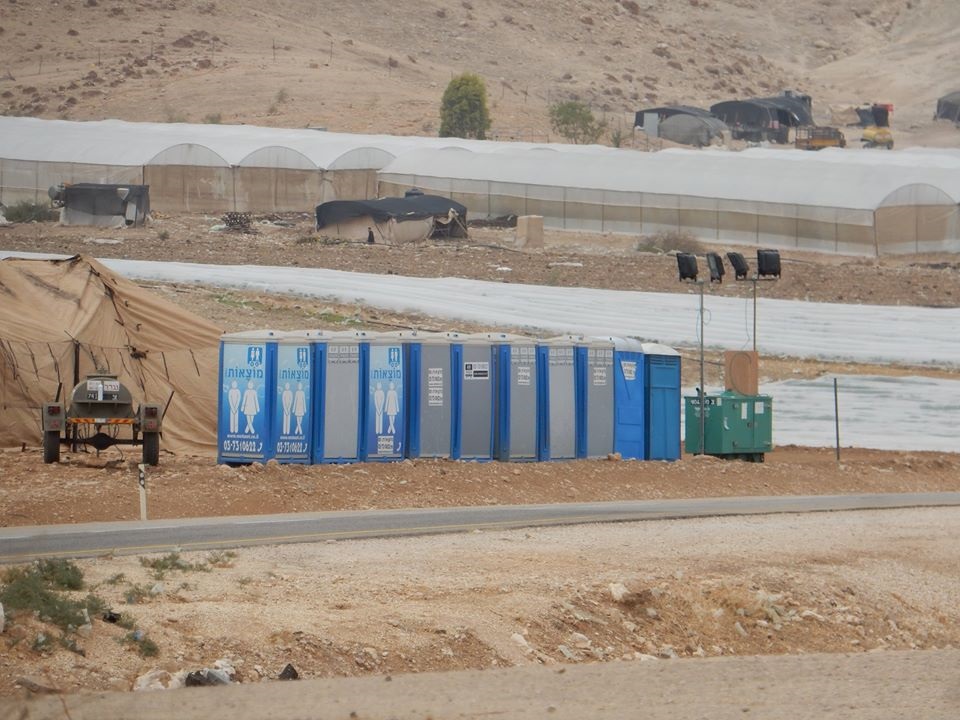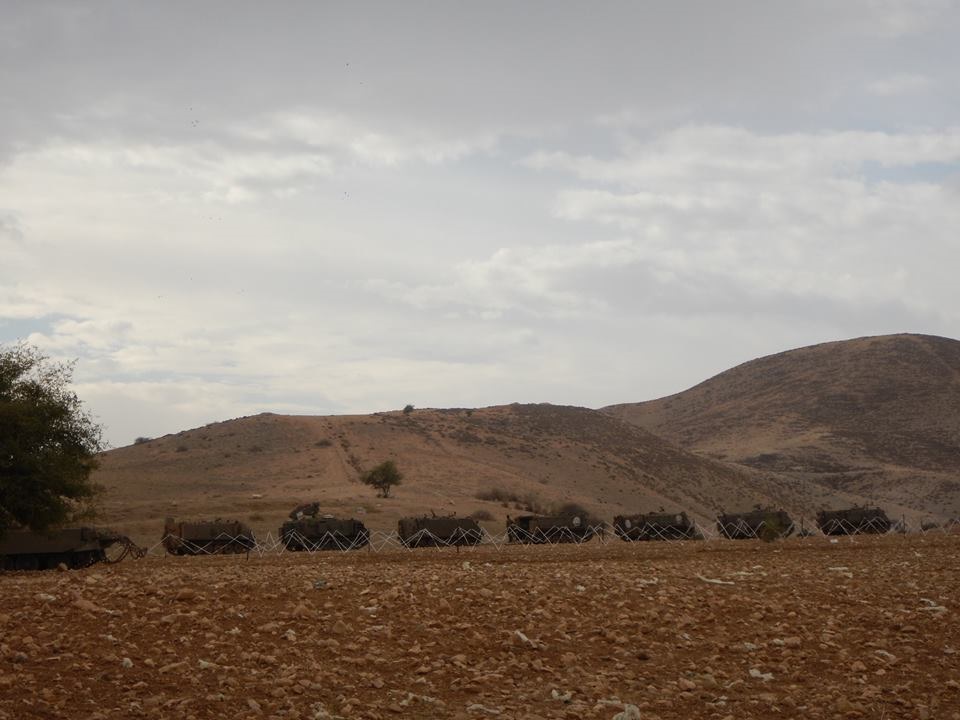Gochya, Jordan Valley
The Israeli army is apparently intending to conquer the Palestinian Jordan Valley again in the coming days. One could not miss the tanks standing by the main roadside, their gun barrels pointed at the nearby Palestinian encampments, nor the children who were on their way home from school and saw this abnormal sight opposite their home, the bus unloading soldiers in the area now officially called “firing zone”, the state-of-the-art mechanical latrines, the military police securing the main road, and the heavy trucks transporting the war machines around. I believe the last time this army waged war against another army and made use of tanks was in 1973… well, they can be aired from time to time over the Palestinians’ heads.

The Zob’a family, living above Beqa’ot (Hamra) Checkpoint, had the ‘honor or pleasure’ of a visit to their home by a military force. Purpose: neutralizing an existential threat to Israel – removing a Palestinian flag hanging on their home. An officer and two women-soldiers were allotted this fateful mission, at the end of which peace and quiet were restored. And Mahmoud, with a broad smile, told us he will hang it up again. Between us – it’s his right.

The inhabitants of Ras Al Ahmar, who for weeks now have been living under the terror of repeated military maneuvers, were issued yet another evacuation order for next week, from Tuesday to Thursday. Where will they go? Who knows… The nights are freezing cold and a heavy storm is forecast over the weekend.
As we arrived at Gokhia Gate, a procession arrived – “tractor confiscation procession” – headed by a Civil Administration vehicle, followed by a tractor driven by a scared, helpless Palestinian, and ending with an army jeep filled with jolly soldiers who have no idea whether they are in possession of a confiscation order or not, or know the reason for it, nor where the man and his tractor are being taken. They don’t know. “Have a nice day”. We know that the State of Israel has confiscated 8 tractors in the past few weeks, and that their owners have remained with no means of transporting water. Releasing every single tractor will cost 4000 shekels. Where are people living in tin shacks and tents going to raise 4000 shekels for each tractor??

At En Sukut the settlers hurry to set facts on the ground. This is a vast (about 1000 dunam) and fertile area in the northern Palestinian Jordan Valley, close to the border fence. On the Jordanian side farming use of the ground is apparent, everything is green and cultivated. On the Israeli –occupied side, it’s all yellow and dusty.
Lately some of this land has been officially returned to its Palestinian owners after a prolonged legal battle, but – wonder of wonders – the army is preventing the Palestinians from returning and cultivating their plots!
The settlers, on the other hand, are already vigorously plowing the Palestinians’ land and sowing wheat there. Researcher A. spoke to us about the village and area’s history, we saw what remains of Khirbet Sukut’s stone houses after the village was ruined in 1967 and its inhabitants scattered. Its remains are still here, and there are numerous ceramic shards of the inhabitants’ kitchen utensils. After the expulsion, the army built a base there and its ditches are still visible. (see photos)
From there we proceeded to visit the Al Hama encampment whose inhabitants face a mushkile kabira – great problem: the settlers of the new outpost above them prevent them from letting their flock graze on the nearby hill, and they fear that if they insist, they will be hurt. If they mount the hill with their flock an armed settler might come and shoot them. No one really cares, after all, the settlers/soldiers will place a knife next to the Palestinian’s body and accuse the Palestinians yet again. We try to think together what to do. They would like to talk with the settlers and find some compromise, but we don’t think any compromise is possible because all the settlers want is to take over more and more land and get rid of Al Hama’s inhabitants, so they would not honor any agreement. And the Palestinians ask – what do we do? We offer to accompany them to their grazing ground, and even have women come along and document the venture. But they are concerned – what will happen the day after? Or at night? “I cannot resist by myself” says Abu Rasmi. When we left, the inhabitants remained with their great problem – How do we survive here now?
In Khalat Makhoul the inhabitants are preparing for winter, reinforcing their tin roof so the rain will not flood the shack from inside. Outside they fear making any changes – so as not to provoke the army to come and demolish their home. Life in the terrible shadow of losing one’s home is unbearable! Burhan tells us that if Aby Khalaf dies, God forbid, he will get up and leave. These two men hold on to each other at this difficult place, and our heart goes out to the two of them. (Note: Burhan’s wife is ill and with the lack of proper conditions and medical care on site, she spends most of the time in the Central West Bank, while 80-year old Abu Khalaf lives alone nearby).
On our way back we thought out loud how these people manage to hold on like this for so many years?
And a final note: everywhere we visited Palestinians inquired about the fires in Israel, about how people were faring, what happened to homes, trees. Their concern is so touching, and in light of this, incitement on the part of the person serving as Israel’s Prime Minister as well as his minsters is all the more painful.

=============================
A few words on confiscating tractors in the Palestinian Jordan Valley:
In 1967 Israel took over all the water sources in the Palestinian Jordan Valley and it directs 80% of the water to its settlements. It does not allot a single drop of water to the numerous shepherd communities in this region. Moreover – it actively prevents them, forbids them to bore new wells, repair or deepen existing ones that have gone out of use with the years. The Israeli army has even filled and destroyed rainwater holes!
Consequently Palestinian must travel far, at great expense, to transport their meager water supply. Having no vehicles and no roads (the army prevents them from preparing dirt tracks and destroys them if such are created) – the tractor is the only means for these people to obtain water. Attached to the water tanker, it hobbles over non-roads until it gets to the central West Bank springs and delivers water back to these communities.
Without the tractor there is no water, and without water there is no life. However! 80% of the northern Palestinian Jordan Valley have been declared firing zones (barring the settlements, their fields and roads serving Israelis, of course)- so that even the Palestinians’ living area and their approaches to water sources are deep inside such firing zones and provide the pretext to confiscate and harass and make a pretty penny at the expense of the poorest of the poor.
So how will they survive there? They won’t! They’ll be forced to leave. This is the real point of the matter. Transfer!
What I can’t wrap my head around is how the Jews, a people who has known so much suffering, can possibly be so cruel to another people?
